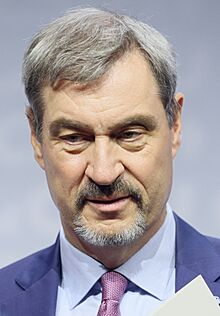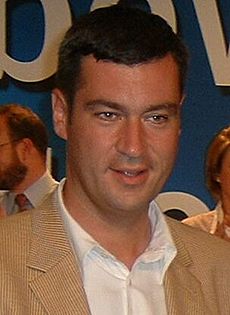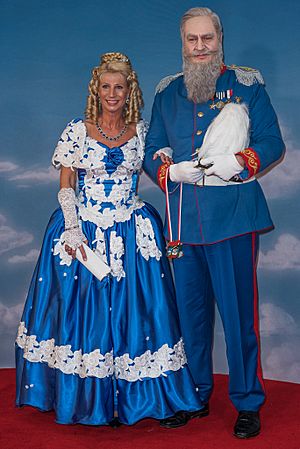Markus Söder facts for kids
Quick facts for kids
Markus Söder
MdL MdBR
|
|||||||||||||||||||||||||||||||||||
|---|---|---|---|---|---|---|---|---|---|---|---|---|---|---|---|---|---|---|---|---|---|---|---|---|---|---|---|---|---|---|---|---|---|---|---|

Söder in 2025
|
|||||||||||||||||||||||||||||||||||
| Minister-President of Bavaria | |||||||||||||||||||||||||||||||||||
| Assumed office 16 March 2018 |
|||||||||||||||||||||||||||||||||||
| Deputy | Ilse Aigner Hubert Aiwanger |
||||||||||||||||||||||||||||||||||
| Preceded by | Horst Seehofer | ||||||||||||||||||||||||||||||||||
| Leader of the Christian Social Union | |||||||||||||||||||||||||||||||||||
| Assumed office 19 January 2019 |
|||||||||||||||||||||||||||||||||||
| General Secretary | Markus Blume Stephan Mayer Martin Huber |
||||||||||||||||||||||||||||||||||
| Preceded by | Horst Seehofer | ||||||||||||||||||||||||||||||||||
|
|||||||||||||||||||||||||||||||||||
| General Secretary of the Christian Social Union |
|||||||||||||||||||||||||||||||||||
| In office 17 November 2003 – 22 October 2007 |
|||||||||||||||||||||||||||||||||||
| Leader | Edmund Stoiber Erwin Huber |
||||||||||||||||||||||||||||||||||
| Preceded by | Thomas Goppel | ||||||||||||||||||||||||||||||||||
| Succeeded by | Christine Haderthauer | ||||||||||||||||||||||||||||||||||
| Member of the Landtag of Bavaria for Nuremberg-East (Nuremberg-West; 1994–2018) |
|||||||||||||||||||||||||||||||||||
| Assumed office 20 October 1994 |
|||||||||||||||||||||||||||||||||||
| Preceded by | Heinz Leschanowsky | ||||||||||||||||||||||||||||||||||
| Succeeded by | Jochen Kohler | ||||||||||||||||||||||||||||||||||
| Personal details | |||||||||||||||||||||||||||||||||||
| Born |
Markus Thomas Theodor Söder
5 January 1967 Nuremberg, Bavaria, West Germany |
||||||||||||||||||||||||||||||||||
| Political party | Christian Social Union (since 1983) | ||||||||||||||||||||||||||||||||||
| Spouse |
Karin Baumüller
(m. 1999) |
||||||||||||||||||||||||||||||||||
| Children | 4 | ||||||||||||||||||||||||||||||||||
| Alma mater | University of Erlangen–Nuremberg | ||||||||||||||||||||||||||||||||||
| Military service | |||||||||||||||||||||||||||||||||||
| Allegiance | |||||||||||||||||||||||||||||||||||
| Branch/service | |||||||||||||||||||||||||||||||||||
| Years of service | 1986–1987 | ||||||||||||||||||||||||||||||||||
| Unit | |||||||||||||||||||||||||||||||||||
Markus Söder is a German politician born on January 5, 1967. He is currently the Minister-President of Bavaria, a state in Germany. He has held this important role since 2018. He is also the leader of a political party called the Christian Social Union in Bavaria (CSU), a position he took on in 2019.
Contents
Early Life and Education
Markus Söder was born in Nuremberg, Germany. His father worked as a building contractor. After finishing high school in 1986, Söder completed his required year of military service.
He then went on to study law at the University of Erlangen–Nuremberg starting in 1987. He received a scholarship to help with his studies. In 1991, he passed his first major law exam. Later, in 1998, he earned a special degree in law.
Before becoming a full-time politician, Söder worked as a trainee and editor at a public TV and radio network called Bayerischer Rundfunk from 1992 to 1994.
Political Journey
Starting in Bavarian Politics
Söder became a member of the Landtag of Bavaria, which is the state parliament of Bavaria, in 1994. From 2003 to 2007, he served as the general secretary of the CSU party. The CSU is a sister party to the Christian Democratic Union of Germany (CDU). In this role, he worked closely with the Minister-President and party leader at the time, Edmund Stoiber.
He also helped the CDU/CSU group in talks with another major party, the Social Democratic Party of Germany (SPD). These talks led to the formation of Chancellor Angela Merkel's first government after the 2005 federal elections.
Söder has been a minister in several Bavarian governments. From 2007 to 2008, he was Bavaria's State Minister for Federal and European Affairs. Then, from 2008 to 2011, he was the State Minister for Environment and Health.
State Minister of Finance
From 2011 to 2018, Markus Söder served as the Minister of Finance for Bavaria. In this role, he was also one of Bavaria's representatives in the Bundesrat, which is like Germany's upper house of parliament. He worked on financial matters for the state.
One of his big tasks was to help a state-backed bank called BayernLB get back on track. He also helped settle legal disagreements between Bavaria and Austria related to another bank.
In 2012, Söder and Minister-President Horst Seehofer filed a lawsuit to change how money is shared between richer and poorer states in Germany. Söder also led Bavaria to take legal action against Volkswagen because of a scandal involving car emissions. He argued that the state's pension fund lost money due to this scandal.
After the 2017 national elections, the CSU party lost many votes. As a result, Horst Seehofer decided to remain party chairman but agreed to let Söder become the leader of Bavaria. This change happened after a long period of disagreement between Söder and Seehofer.
Minister-President of Bavaria
In March 2018, lawmakers officially chose Markus Söder as the new Minister-President of Bavaria. He took over from Horst Seehofer, who became a federal minister. Söder received a good number of votes from the state deputies.
In the 2018 Bavarian state election that followed in October 2018, the CSU party, with Söder as their top candidate, had their lowest result since 1950. They received 37% of the votes, which was a big drop from 2013. Because of this, Söder had to form a government with a smaller party called the Freie Wähler.
In January 2019, members of the CSU party elected Söder to replace Seehofer as their leader. He was the only candidate and received a large majority of the votes.
Possible Candidate for Chancellor
During the COVID-19 pandemic in Germany, many people thought Markus Söder might become a candidate for Chancellor of Germany in the 2021 federal election. A poll in May 2020 showed that many Germans supported him for this role. He was also very popular in Bavaria, with over 90% approval.
However, after Armin Laschet was elected as the CDU chairman in January 2021, both he and Söder were considered the main contenders for the Chancellor position. The two leaders could not agree on who should run. The federal CDU board then voted, and Laschet received more support. After this vote, Söder announced his support for Laschet as the Chancellor candidate.
On June 21, 2021, Söder and Laschet presented their joint election plan for the CSU and CDU parties. The plan focused on fighting pandemics, climate change, and protecting prosperity and freedom. They aimed for a Germany that is open to the world and works towards both modernization and green policies.
In September 2021, Söder was reelected as the chairman of the CSU party. In September 2024, Söder announced his support for Friedrich Merz as the Union's candidate for Chancellor in the 2025 German federal election.
Other Activities
Markus Söder has been involved in various other activities:
- He is the chairman of the supervisory board for Munich Airport and Nuremberg Airport.
- He was a member of the supervisory board for BayernLB, a bank.
- He has been a member of the board of trustees for several non-profit organizations, including the Bavarian Research Foundation and the Deutsches Museum.
- He is also a member of the advisory board for the football club 1. FC Nürnberg.
Political Views
European Cooperation
During the time when Greece was facing financial problems, Söder was one of the politicians who strongly suggested that Greece should leave the Eurozone (the group of countries using the Euro currency). He believed that this would show that the Eurozone could be strict. In early 2018, Söder also said he was against expanding the Eurozone to include more countries like Bulgaria and Romania.
Policies in Germany
In 2018, Söder's government in Bavaria introduced a rule called Kreuzpflicht. This rule requires that crosses be displayed at the entrance of public buildings. Söder explained that these crosses are not just religious symbols but also represent Bavarian culture. During his campaign for the 2018 state elections, Söder aimed to appeal to people who like traditional values. He also wanted to improve Bavaria's image as a high-tech region by promising a new space program and better internet access.
Immigration
During the European migrant crisis, Söder often criticized the policies of Angela Merkel regarding migrants. He worried about security issues and doubted that so many people could be successfully integrated into society. Söder believed that Germans did not want a multicultural society and that refugees should return to their home countries if possible. He felt that Chancellor Merkel's phrase "We can do it" was not the right message.
COVID-19 Pandemic
During the COVID-19 pandemic in Germany, Söder was the first Minister-President to announce a lockdown in his state. His handling of the pandemic made him more popular. In late 2021, there was some discussion about low vaccination rates in Bavaria, and Söder supported mandatory vaccinations.
Family Policies
In a July 2020 interview, Söder expressed support for same-sex marriage in Germany.
International Relations
As Minister-President, Söder has traveled to other countries to meet with leaders. For example, he met with the President of Ethiopia in 2019, the President of Russia in 2020, the Prime Minister of Croatia in 2022, the Minister of Foreign Affairs of Israel in 2023, the Premier of China in 2024, the Prime Minister of Italy in 2024, and the Minister of External Affairs of India in 2025.
Awards and Recognition
- In 2024, he received an honorary doctorate from Tsinghua University.
Personal Life
Markus Söder married Karin Baumüller in 1999. Karin Baumüller is one of the owners of a company called Baumüller Group, which makes electric automation systems. They have three children together. Söder also has a daughter from an earlier relationship.
Söder is a member of the Protestant Church in Germany and has said he is a "believer." He is also known for wearing fun and creative costumes during the carnival season, like dressing up as Shrek or Marilyn Monroe.
See also
 In Spanish: Markus Söder para niños
In Spanish: Markus Söder para niños
 | William L. Dawson |
 | W. E. B. Du Bois |
 | Harry Belafonte |



